|
|
|
Sort Order |
|
|
|
Items / Page
|
|
|
|
|
|
|
| Srl | Item |
| 1 |
ID:
170361
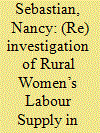

|
|
|
|
|
| Summary/Abstract |
This article examines the role of household poverty in shaping rural female labour supply using the unique panel dataset of India Human Development Survey. The results using Vella and Verbeek’s two-step panel estimation reveal the presence of a backward-sloping labour supply curve for rural women from below poverty line households, and an upward-sloping labour supply for rural women from above poverty line (APL) households. This implies the existence of ‘forced’ or ‘need-based’ participation among poor women and justifies why they work long hours in poorly paid hazardous jobs. The article also finds horizontal labour supply among agriculture wage workers and for Adivasi and Dalit rural women to some extent, reflecting limited job options, and surplus unskilled labour who are unable to demand higher wages for their labour supply. On the other hand, when categorised by occupation type, the downward-sloping labour supply for rural women from APL households indicates the dominance of the income effect over the substitution effect, and the socio-cultural factors that gain strength as income levels increase.
|
|
|
|
|
|
|
|
|
|
|
|
|
|
|
|
| 2 |
ID:
158203
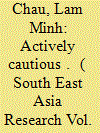

|
|
|
|
|
| Summary/Abstract |
This article uses the case of a northern Vietnamese village to explore how rural households in Asia have negotiated both the opportunities and challenges of marketization and capitalist industrial modernity. I focus on the Vietnamese state’s push to marketize village livelihoods by means of mass establishment of industrial parks comprising largely Foreign Direct Investment factories in the countryside. The state expects young villagers to abandon low-value agricultural livelihoods and treat factory work as their only livelihood strategy and the lifetime warranty of their well-being. Yet while young villagers have been responsive to new opportunities of industrial employment, they have all treated factory work in ways very different from what the state expects: merely as one of their household’s diverse portfolio of livelihood options. I argue that villagers have handled the encounter with industrial modernity in ways rarely documented in the literature on marketization in rural Asia: as ‘actively cautious’ decision-makers, who actively pursue industrial employment to improve their family’s living standards, and carefully maintain a portfolio of livelihood strategies to protect the family’s well-being from the many insecurities of the industrial workplace.
|
|
|
|
|
|
|
|
|
|
|
|
|
|
|
|
| 3 |
ID:
106766
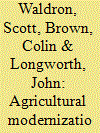

|
|
|
| 4 |
ID:
099638


|
|
|
|
|
| Publication |
2010.
|
| Summary/Abstract |
Three main factors explain public support for EU membership: utilitarian expectations, the role of values and ideas, and class partisanship. In the Polish case, public opinion polls and issues more specific to Poland, such as the role of the Catholic Church, populist political parties and profound Euroscepticism among farmers, suggest that although these theoretical explanations overlap, each of them has a different explanatory value. The economic approach remains the best predictor of support for EU membership, and whereas values and identity are closely linked to and dependent upon economic expectations, the impact of national politics appears largely decoupled from Polish Euroscepticism.
|
|
|
|
|
|
|
|
|
|
|
|
|
|
|
|
| 5 |
ID:
090969
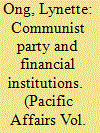

|
|
|
|
|
| Publication |
2009.
|
| Summary/Abstract |
Although the rural credit cooperatives are the only formal credit providers to millions of households in rural China, empirical evidence suggests that they do not serve the interests of member households very effectively. This study examines how far the recent institutional reforms have addressed the problems of insider control and collective action in corporate governance and reduced local political influence on their operations.
It contributes to the currently scant literature on the reasons for the persistence in China of local political interference in loan allocations. This study's findings suggest the need for a re-evaluation of the conventional wisdom that the role of local states in China's development is a positive one.
|
|
|
|
|
|
|
|
|
|
|
|
|
|
|
|
| 6 |
ID:
100820
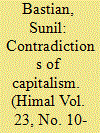

|
|
|
| 7 |
ID:
155168
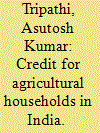

|
|
|
|
|
| Summary/Abstract |
Why has the share of non-institutional finance sources for agricultural households not come down between 2002 and 2012? Is the dependency on non-institutional sources the same across farm size classes? Who are the major beneficiaries of the revival in agricultural credit in the 2000s? Are larger farmers becoming more productive and commercial thus requiring higher levels of credit? Are small farms becoming unviable, making it difficult for banks to finance them? This paper examines these issues empirically based on data from the Situation Assessment Survey (SAS) of Agricultural households and the All India Debt and Investment Survey (AIDIS) conducted by the National Sample Survey Organization (NSSO) in its 59th (i.e. 2003) and 70th round (i.e. 2013) and various publications from the Reserve Bank of India (RBI).
|
|
|
|
|
|
|
|
|
|
|
|
|
|
|
|
| 8 |
ID:
165216
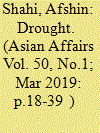

|
|
|
|
|
| Summary/Abstract |
Approximately 97% of the country is experiencing drought conditions. Due to gross water mismanagement and its damaging impact on the country, Iran faces the worst situation in water resources of any industrialized nation. Tens of thousands of villages have been deserted and most of the major urban centers have passed their limits to absorb new rural migrants. Some officials predict that in less than 25 years, 50 million Iranians would be displaced from their current homes because of the pressing ecological conditions. This is happening at the time that the gap between the grassroots and the state has widened and there is increasing dissatisfaction with governance plagued by corruption, nepotism, economic mismanagement, unaccountability and a foreign policy which has produced various regional and trans-regional adversaries. This paper evaluates the pressing ecological challenges in Iran and by conceptualizing political resilience it critically evaluates whether the Islamic Republic is prepared to face the devastating ecological crisis and its socio-economic consequences.
|
|
|
|
|
|
|
|
|
|
|
|
|
|
|
|
| 9 |
ID:
185584
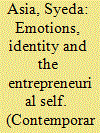

|
|
|
|
|
| Summary/Abstract |
This article explores the relationship between emotions, identity and work in the narratives of Muslim women in rural Jhunjhunu, Rajasthan, India. The article uses an in-depth account of two families where all women engage in income generating work. The women experience complex challenges, struggles and negotiations, and they make remarkable decisions in resolution. The role their emotions play in their decisions articulates an entrepreneurial self that offers a newer interpretation of the relationship between emotions, identity and work. By detailing their struggles, negotiations and remarkable decisions, this article attempts to move towards a sociology of hope that marks the spirit of these women in overcoming the constraints in their everyday.
|
|
|
|
|
|
|
|
|
|
|
|
|
|
|
|
| 10 |
ID:
180102
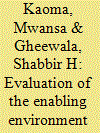

|
|
|
|
|
| Summary/Abstract |
The low adoption rates of modern bioenergy systems in the rural areas of Zambia indicate shortcomings within the existing institutional arrangements for a conducive enabling environment for their deployment. To address them, this study employed the SWOT–AHP (Strengths, Weaknesses, Opportunities, Threats-Analytic Hierarchy Process)-TOWS (Threats, Opportunities, Weaknesses, Strengths) technique to assess the effectiveness of such arrangements by building on the insight of the identified stakeholders. This led to the generation of ideas for further policy development for rural-based bioenergy systems. The SWOT-AHP analysis shows that the negative aspects (weaknesses and threats) associated with the enabling environment for the promotion of rural-based bioenergy systems dominate their positive counterparts (strengths and opportunities). Among others, the following policy considerations are vital to the enhancement of the enabling environment in this context: (1) building relevant policy actors' analytical capacity in biomass supply chains for cooking and heating fuels, (2) seeking developed-country support for the effective transfer of bioelectricity technologies, and (3) developing a framework used in planning for the sustainability of rural-based bioenergy systems. To increase the likelihood of their adoption, these strategies must be aligned with the country's higher-level national development goals.
|
|
|
|
|
|
|
|
|
|
|
|
|
|
|
|
| 11 |
ID:
137723


|
|
|
|
|
| Summary/Abstract |
This paper is interested in sustainable energy initiatives in French rural areas. It follows up the UK debate about ‘localism’. UK policy localism has been cast as neoliberal, framing communities as competent and competitive actors, morally responsible and accountable for their destiny. In France, the emerging policy localism is surfing on an ongoing political structuration of innovative rural territories – ‘Positive Energie Territories’ (TEPOS). The paper presents and discusses the results of a rough census (undertaken in 2012) of significant experiences in this domain. It points to a few experiences and depicts them as risky, trial-and-error transcalar processes that endow locally emergent energy issues with a political dimension. To this extent, they amount to a different way of doing energy policy. The analysis points to an ambiguity in French policy localism. This localism may pave the way for an upscaling of the ongoing TEPOS political structuration, or tend to make TEPOS into demonstration territories within a neoliberal RTD policy approach. In the latter case, it may not necessarily fit territories to pursue their political structuration with a view to the energy transition.
|
|
|
|
|
|
|
|
|
|
|
|
|
|
|
|
| 12 |
ID:
105072
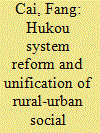

|
|
|
|
|
| Publication |
2011.
|
| Summary/Abstract |
Using a political economy analytical framework, the present paper examines the hukou system reform in China. The potential unification of the social welfare system of rural and urban areas is discussed. The paper reviews the progress of hukou system reform since 2004. It is suggested that since China met its Lewis turning point in about 2004, and a labor shortage became a limiting factor in production, there has been stronger demand for hukou system reform. In the meantime, various levels of government have a point where incentives are compatibile for carrying out reforms. The paper also explores some limitations of the currently implemented reform in certain regions and puts forward relevant policy suggestions.
|
|
|
|
|
|
|
|
|
|
|
|
|
|
|
|
| 13 |
ID:
192965
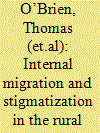

|
|
|
|
|
| Summary/Abstract |
Eastern Europe has seen considerable social, economic and political upheaval since 1989. Migration has been an important element of this change, with the removal of restrictions enabling individuals to move in search of opportunities. Resulting patterns of internal migration rest on a longer history of movement, linked to the communist-era pursuit of economic development and modernization. Proximity to Western Europe has seen some regions receive greater migrant flows, leading to resentment and distancing among the resident population. Focusing on rural settlements in the Banat region, southwestern Romania, this article examines how receiving communities perceive the effects of internal migration. The findings suggest entrenched stereotypes established during the communist-era remain prominent in patterns of stigmatization and maintenance of social distance. They also point to underlying tensions between the desire to protect local culture and tradition, while ensuring the continued viability of small settlements in the face of threats of depopulation.
|
|
|
|
|
|
|
|
|
|
|
|
|
|
|
|
| 14 |
ID:
098347
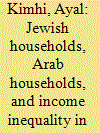

|
|
|
|
|
| Publication |
2010.
|
| Summary/Abstract |
This paper quantifies the roles of ethnicity, gender and location in rural income inequality in Israel. Between 10 and 16% of rural income inequality is explained by the Jewish-Arab divide. Schooling and household size, which are respectively much lower and higher among the rural Arab population, also explain significant fractions of income inequality. Location and gender of the household head explain much smaller fractions. Education-enhancing policies directed at the lower end of the schooling distribution, and at Arab municipalities in particular, are recommended to reduce per capita income inequality in rural Israel and narrow the Jewish-Arab gap. This could contribute to reducing the tension between the Jewish majority and the Arab minority in Israel, and to creating a better atmosphere for their neighborly coexistence.
|
|
|
|
|
|
|
|
|
|
|
|
|
|
|
|
| 15 |
ID:
138939
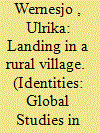

|
|
|
|
|
| Summary/Abstract |
This article explores how unaccompanied young refugees living in a rural village in Sweden make sense of home and belonging. From a post-structuralist approach, belonging and home are understood as ongoing processes that are negotiated with others, and via processes of othering and racialisation. This article demonstrates that the form of housing available, together with experiences of social exclusion in the village, may contribute to othering and thus challenge their feelings of home and belonging. However, they do construct some kinds of belonging and feelings of home based on social relationships and places that they have access to.
|
|
|
|
|
|
|
|
|
|
|
|
|
|
|
|
| 16 |
ID:
162425
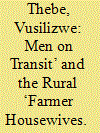

|
|
|
|
|
| Summary/Abstract |
Studies on migrant-labour systems have focused on the negatives, particularly on women left behind as guardians of men’s interests, but with no real control. My extended research on former migrant-labour societies in north-western Zimbabwe has challenged this ‘doomsday’ narrative. It did not only reveal the feminisation of household and societal decisions, but also how the migration of men has liberated women and allowed them to play crucial roles within the household and society systems. My study thus illuminates differences between rural societies and cautions against the risks of over-generalisation when looking at the relationship between women and migration. It stresses the importance of migration on development, and the empowerment potential on women who take up prominent positions in the household and in society decision-making structures.
|
|
|
|
|
|
|
|
|
|
|
|
|
|
|
|
| 17 |
ID:
113658
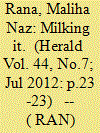

|
|
|
| 18 |
ID:
138250
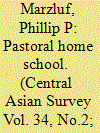

|
|
|
|
|
| Summary/Abstract |
Literacy before and after the 1921 People’s Revolution in Mongolia has been largely represented by socialist historiography and post-socialist urban perspectives, which have rendered unofficial and non-pragmatic literacies invisible. This study explores rural, vernacular and grassroots literacy theories to recontextualize the pre-revolutionary category of Mongolian home schooling and to offer a new perspective – pastoral literacy – which enables historians and other researchers of Central Asia to represent the literacy practices of non-urban semi-nomads more accurately and vividly. This study applies the pastoral literacy perspective to literacy narratives extracted from University of Cambridge Oral History of Twentieth Century Mongolia interviews and demonstrates that pastoral home schooling was a socially and culturally salient domain for acculturating young Mongolians into the 1960s. Mongolian pastoral home schooling consisted largely of personal, male teacher–student relationships, authoritative teaching models, alphabet-based curricula, as well as texts and materials adapted from dominant religious and state literacies.
|
|
|
|
|
|
|
|
|
|
|
|
|
|
|
|
| 19 |
ID:
133517


|
|
|
|
|
| Publication |
2014.
|
| Summary/Abstract |
This article modifies the associations made by historians and political scientists of Spanish guerrilla warfare with revolutionary insurgency. First, it explains how the guerrilla phenomenon moved from a Leftist to a reactionary symbol. Second, it compares the insurgency and counter-insurgency features of the Carlist War (1833-1840) with those of the better-known Peninsular War (1808-1814). Third, it shows how erstwhile guerrilla leaders during the Carlist War made their expertise available to the counter-insurgency, in a socio-economic as well as military setting. This article revises the social banditry paradigm in nineteenth-century Spain in the under-researched context of Europe bloodiest nineteenth-century civil war.
|
|
|
|
|
|
|
|
|
|
|
|
|
|
|
|
| 20 |
ID:
084532
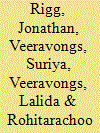

|
|
|
|
|
|
|
|